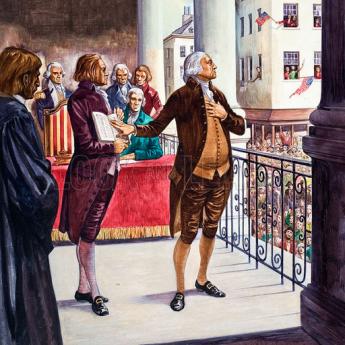Related Topics
Government Organization
Government Organization
Shaping the Constitution in Philadelphia
After Independence, the weakness of the Federal government dismayed a band of ardent patriots, so under Washington's leadership a stronger Constitution was written. Almost immediately, comrades discovered they had wanted the same thing for different reasons, so during the formative period they struggled to reshape future directions . Moving the Capitol from Philadelphia to the Potomac proved curiously central to all this.
...Pre-Convention Events
We had a varsity team, but we needed a plan.
Popular Passages
New topic 2013-02-05 15:24:06 description
Lumpers, Splitters and Technicians: The Framers of the American Constitution
 Half a dozen distinguished colonists came to believe the thirteen American colonies could not survive unless they banded together. Eight years of bitter experiences during the Revolutionary War had taught them they must unite. We might call them lumpers.
Half a dozen distinguished colonists came to believe the thirteen American colonies could not survive unless they banded together. Eight years of bitter experiences during the Revolutionary War had taught them they must unite. We might call them lumpers.
A Gleam in Washington's Eye

|
| George Washington Taking Oath |
On the eve of the Constitutional Convention, the nation was unhappy, confused, and dissatisfied; this wasn't what a victory was supposed to feel like. George Washington wanted a country to be proud of, big enough to discourage enemies, otherwise free of policing, regulation, or monarchy. Eight years of war had taught him it wasn't easy to have both liberty and discipline at the same time. Perhaps America was more unusually blessed, however, defended from invasion by oceans and wilderness, and from greed by a continent of natural resources. If order and justice could be organized, perhaps this by itself would enlist the loyalty of that mixture of classes and nationalities then flocking to our shores. Several important writers were having a strong influence on the era we now call the Enlightenment; David Hume and Adam Smith in Scotland, Edward Gibbon in England, Voltaire and Diderot in France, even Catherine the Great of Russia, with a thousand others including Benjamin Franklin and Robert Morris. Although Washington probably hadn't read them, Adam Smith's The Wealth of Nations showed unvarnished new ways of looking at commerce and politics, while Gibbon's The Decline and Fall of the Roman Empire showed what could happen if idealism gets neglected. Both books were published in the portentous year of 1776, describing many difficulties, but always suggesting problems could somehow be solved. There were plenty of ideas in circulation, but there was no plan.
It must have become obvious to Washington well before the Battle of Yorktown, that the Revolutionary War would not leave us with our problems solved. There was one brief moment as the British Army was withdrawing from Philadelphia in 1778 which seemingly justified boasts our troops had licked 'em. Just after the surrender of a whole British Army at the Battle of Saratoga, the British were also retreating from Philadelphia, and the Lord North offered generous peace terms through the Earl of Carlisle. No doubt the British public was restless after the Burgoyne defeat and the French alliance with America. Because the Carlisle episode is much more familiar in England than in America, perhaps it was a feint or a maneuver to embarrass the Earl of Carlisle or possibly just an exploration of the true state of affairs which were rumored about across a wide ocean. At any event, Gouverneur Morris was the visible American actor in this puzzling episode, but he must have been acting in concert with others. Lord North offered to give us our own elected parliament within a commonwealth; taxation with representation, no less. Morris seems to have dismissed this offer with contempt. But six more years of devastation ensued, surely convincing Washington that bitter defeat was still possible. That reality was concealed behind the graciousness of the French in allowing us to claim American troops had defeated the British at Yorktown. In fact, the preponderance of troop casualties, naval vessels and strategy had been French. The money had been mostly French as well. If that debt nearly bankrupted France, what might it have done to America?
Washington had been an outstanding athlete, soldier, and farmer, but his many travels about the colonies convinced him something more than leadership was needed. You just can't defeat a powerful enemy with short enlistments which give soldiers a legal right to go home on the eve of battle, and no way for the central command to extend the enlistments. To this, Robert Morris added that you can't buy gunpowder without the central power to levy taxes to pay for them. Morris warned him more was needed than a confederation so big others would leave it alone. Even temporary power wasn't enough. National disorganization had been just as bad after the Revolution as before. By 1787, Washington concluded the states just would not surrender power to a central national government unless the people forced them to give it up, and after a brief patriotic fervor, the people mostly wanted to go home for spring plowing. Peacetime also demonstrated another discouraging truth: meaningful improvement of the existing order meant the whole previous leadership class might leave public service to less qualified leaders, watching peace attract mediocrity to political office. Prominent men in the community gathered in a Constitutional Convention recognized the advantages of Union and devising peaceful ways to maintain it. After that transient moment when the memory of the war was fresh, politics could return to the mediocrities of a political class. That's not exactly what is now meant by "We, the People", but it might have to serve. In Washington's view, the voice of the people usually echoed along the lines of Tell us what good it would do to upset the Articles of Confederation, otherwise leave them alone. If you propose the general shape of a new central government, first tell us what it can do better than the states. And then show us how to make dubious state politicians agree to it. The accents of hesitation and defeat echo powerfully.
The hideous French Revolution was soon to demonstrate how unwise it was to look for short-cuts; we need a republic, not a stampeded democracy. George Washington was unsure just what was needed, but he knew a few basic things with certainty. America needed a bargain which everyone was expected to keep. A stronger central government should be provided for, and make it difficult to dissolve.
Originally published: Wednesday, December 03, 2008; most-recently modified: Thursday, August 01, 2019
| Posted by: How to get free followers | Feb 13, 2012 9:55 AM |
| Posted by: esalerugs coupon | Feb 13, 2012 9:11 AM |